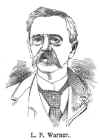his township and has been a member of the school board since the organization of his district.
Mr. Cheeseman has a finely improved half section of land, well stocked with Galloway cattle and fine Norman horses.
Ten children have been born to them; five of them dead. He has an adopted son, named Willie Richards, born March 22, 1874.
The career of Mr. Cheeseman is a fine illustration of what may be accomplished in the space of a comparatively few years by steady and persistent industry and good management; to such men as he northwestern Kansas is indebted for her present prosperous condition.
 Linus Fuller Warner was born in the town of Kent, Litchfield county, Connecticut, March 2, 1822, he attended the common schools; at the age of 38 he began to learn the trade of a carriage maker.
He went to York state 1842 and to Michigan in 1844. He was an engineer on a steamboat on the lakes for four years, he then opened a blacksmith and wagon shop at St. Joseph, Michigan, which he operated until 1862 when he volunteered in the Seventh Michigan cavalry and went as captain of company B.
His regiment served during the balance of the war as a part of Custer's brigade.
He fought in every battle the army of the Patomic [sic] was engaged in except Gettysburg.
He was promoted to major in 1864. His colonel was on detached service and his lieutenant colonel was in Libby prison, which left the major in command of the regiment for two years.
Linus Fuller Warner was born in the town of Kent, Litchfield county, Connecticut, March 2, 1822, he attended the common schools; at the age of 38 he began to learn the trade of a carriage maker.
He went to York state 1842 and to Michigan in 1844. He was an engineer on a steamboat on the lakes for four years, he then opened a blacksmith and wagon shop at St. Joseph, Michigan, which he operated until 1862 when he volunteered in the Seventh Michigan cavalry and went as captain of company B.
His regiment served during the balance of the war as a part of Custer's brigade.
He fought in every battle the army of the Patomic [sic] was engaged in except Gettysburg.
He was promoted to major in 1864. His colonel was on detached service and his lieutenant colonel was in Libby prison, which left the major in command of the regiment for two years.
At the time General Lee surrendered Major Warner was the first to see the flag of truce.
He at once notified his commanding officer, General Custer, who in honor of the event, invited the major to be present when Lee formally surrendered to Grant.
During the time of the engagement in front of Richmond, which opened on March 31 and ended April 30, the major in command of his regiment was in the front ranks all the time.
Major Warner remained in the service until April, 1866, after the grand review May 22,1865, he was stationed at Fort
Collins, Colorado. In October, 1865, he was transferred from the Seventh cavalry to First Michigan veteran cavalry as their first major.
In November, 1866, he was ordered to report at Fort Leavenworth to General Dodge.
He was afterward ordered to join his regiment at Salt Lake, but ill health prevented him from so doing.
In April, 1867, he resigned and went home; in 1868 he was elected sheriff of Berrien county, Michigan, and held the office two terms.
He came to Kansas in June, 1880, and settled at Almena. He was elected to the legislature as a greenbacker in 1882 from this county, defeating Dr. Smith, the republican nominee.
In 1884 he was the fusion nominee for state senator, but was defeated at the polls by H. S. Granger, of Phillips county, the republican
|